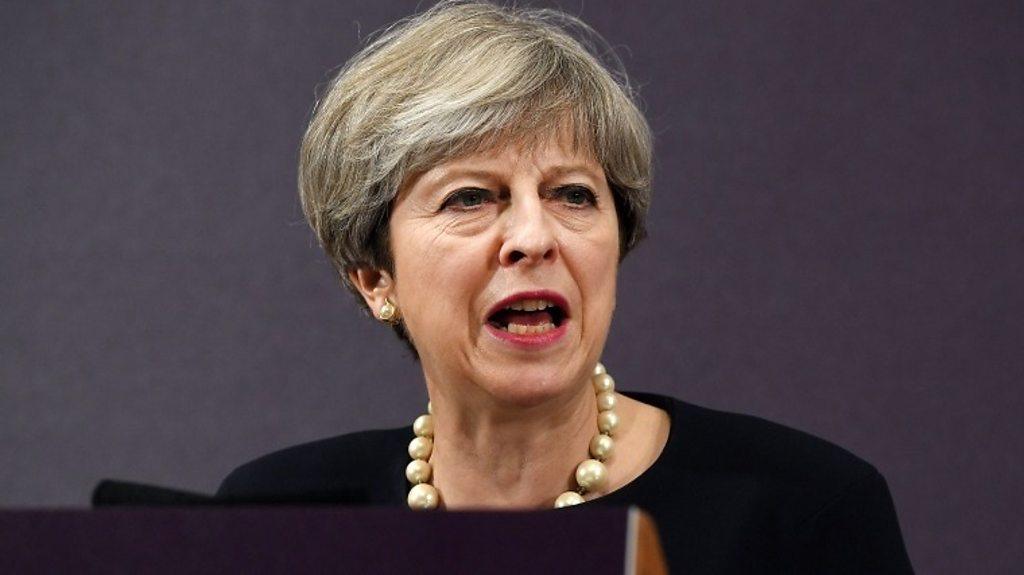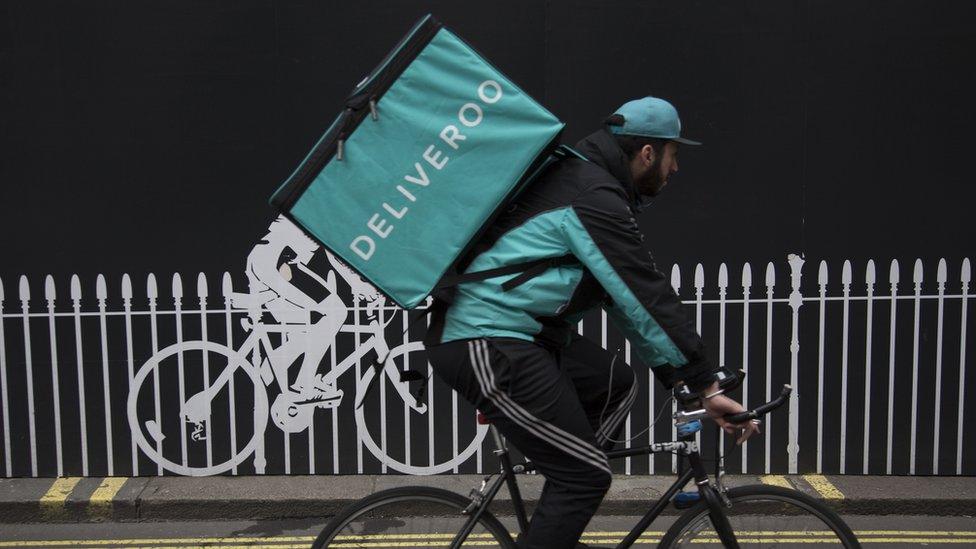Taylor Review: All work in UK economy should be fair
- Published
- comments
Theresa May said it was important to have a "flexible" approach that didn't "exploit workers"
All work in the UK's economy should be "fair and decent", a government review of employment practices has said.
The report, external by former aide to Tony Blair, Matthew Taylor, pays particular attention to the gig economy.
It recommends that workers for firms such as Uber and Deliveroo should be classified as dependent contractors, with extra benefits.
The Prime Minister said the government would take the report's recommendations seriously.
Mr Taylor said there was a perception that the gig economy put too much power into the hand of employers: "Of all the issues that were raised with us as we went around the country, the one that came through most strongly was what the report calls one-sided flexibility.
"One-sided flexibility is where employers seek to transfer all risk onto the shoulder of workers in ways that make people more insecure and makes their lives harder to manage. It's the people told to be ready for work or travelling to work, only to be told none is available."

Taylor recommendations for the government:
• People who work for platform-based companies, such as Deliveroo and Uber, be classed as dependent contractors
• Strategies must be put in place to make sure that workers do not get stuck on the National Living Wage
• The review suggests a national strategy to provide good work for all "for which government needs to be held accountable"
• The government should avoid further increasing the the non-wage costs of employing a person, such as the apprenticeship levy

A spokesperson for the meal delivery service Deliveroo, one of the companies at the heart of the gig-economy debate, said: "We would welcome the opportunity to work with the government so we can end this trade off between flexibility and security."
Mr Taylor's report did not attack the gig economy. It said that flexibility in the workplace was important and had contributed to record high employment.
He pointed to the official Labour Force Survey of March this year, which found that 68% of those on zero hours contracts did not want more hours.
However, he said too many employers and businesses were relying on zero hours, short-hours or agency contracts, when they could be more forward thinking in their scheduling.
Matthew Taylor: gig economy firms should pay national insurance on workers
Earlier, Mr Taylor had told the BBC: "There are too many people at work who are treated like cogs in a machine rather than being human beings, and there are too many people who don't see a route from their current job to progress and earn more and do better."
But he said working platform providers such as Uber had to demonstrate that workers signing on for hours of work would "easily clear" the minimum wage.
Andrew Byrne, head of policy at Uber, said that the average driver took well over the National Living Wage.
He also said Uber "would welcome greater clarity in the law over different types of employment status".
Mr Taylor also suggested that cash payments should be phased-out.
He said cash jobs such as window cleaning and decorating were worth up to £6bn a year and many were untaxed - something Mr Taylor says should be addressed.
Mr Taylor said he did not want to ban cash payments outright, but hoped, over time, the increasing popularity of transaction platforms such as PayPal and Worldpay would see a shift from cash-in-hand work.
"In a few years time as we move to a more cashless economy, self employed people would be paid cashlessly - like your window cleaner. At the same time they can pay taxes and save for their pension," he said.
"Most people who do pay for self-employed labour would like to know that that person is paying their taxes."
'Exploited' workers
However, Labour's shadow business secretary Rebecca Long-Bailey said the review did not go far enough for the 4.5 million people in insecure work.
She told the BBC: "If it looks like a job or it smells like a job then it is a job, and the worker should be employed, and I think in those situations where a worker is carrying out work on behalf of an employer... they should not be exploited as a flexible workers."
Trade unions also said Mr Taylor had not tackled many of the issues facing workers.
TUC general secretary Frances O'Grady said: "From what we've seen, this review is not the game-changer needed to end insecurity and exploitation at work."


- Published11 July 2017

- Published10 July 2017
- Published4 July 2017
- Published10 February 2017
